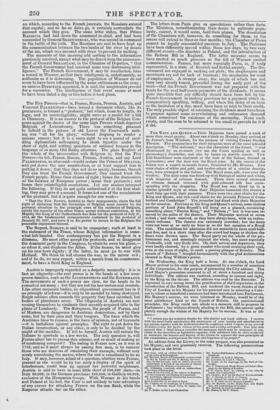The Five Powers—that is, France, Russia, Prussia, Austria, and Viscount
PALmsasrox—have issued a document which, like its precursors, is termed a " protocol," but which, from its length, its logic, and its unintelligibility, might serve as a model for a bill in Chancery. It is an answer to the protocol of the Belgian Con- gress against the decree of the same high Powers which deprived Belgium. of Luxembourg. There was something pleasant to behold in the picture of old Louis the Fourteenth mak- ing war " all for his glory," without deigning to render a meaner reason ; but it is a sorry sight to see a parcel of med- dling diplomatists colleaguing to cloak injustice under the show of right, and settling questions of national honour in the language of so many Old Bailey attornies. The plain English of the whole of the intervention with Belgium is, that the Five Powers—to wit, France, Russia, Prussia, Austria, and my Lord PALMERSTON, as aforesaid—would restore the Prince of ORANGE, and put down the new constitution, or at least support him in putting it down ; that they dare not do so openly, because, though they can trust the French Government, they cannot trust the French people. Hence their claims of right ; hence the discussions of the balance of European power ; hence their protocols ; and hence their unintelligible resolutions. Let our readers interpret the following. If they do not quite understand it at the first read- ing, they may give it a second. It forms but one of the conclusions of the protocol, but it is quite enough for one week- " That the Five Powers, faithful to their engagements, claim the full right of declaring that the Sovereign of Belgium must answer by his personal situation to the principle even of the existence of Belgium, satisfy the security of the other States, accept without restriction, as his Majesty the King of the Netherlands has done for the protocol of July 21, 1814, all the fundamental arrangements contained in the protocol of January 20, 1831, and have it in his power to secure to the Belgians the peaceable enjoyment thereof.
The Regent, SURLET, is said to be unpopular ; such at least is the statement of the Times, whose Belgian information is some- what left-handed. Our contemporary has put the Regent in a dilemma. He must either accept the protocols, and so disappoint the dominant party in the Congress, to which he owes his place,— or refuse it, and displease the Allies. If the former, he must give up his new-born dignity ; if the latter, he must go to war with Holland. We think he will choose the war, as the minor evil ; and if he do, we may expect, within a month from its commence- ment, to have a third King in England.


























 Previous page
Previous page